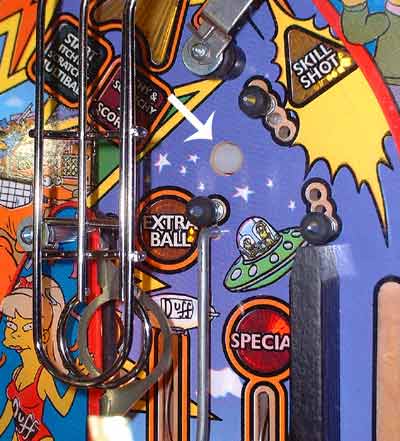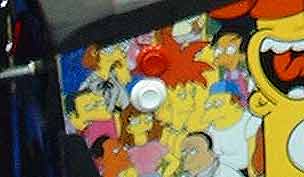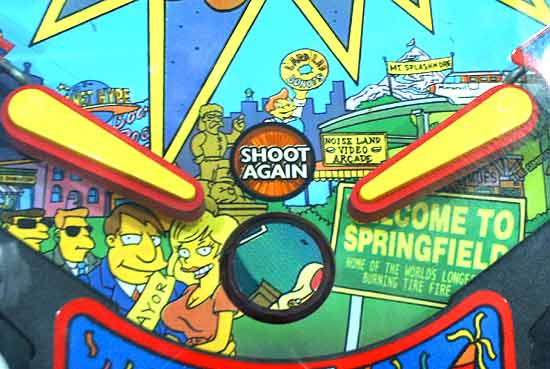|
IT'S IN THE POST |
The UK was unusual in the pinball markets around the world because until quite recently in this country, pinball used to be legally deemed a game of chance rather than skill. That might seem a trivial and somewhat strange definition, but in fact by deciding it was chance-based and not skill-based, the game was treated in similar ways to gaming machines such as the ubiquitous slot (or fruit) machines or video poker terminals for legislative purposes. You may think that there is an obvious difference between slot machines and pinball machines - i.e. that slot machines pay out - but the free game you can win from a pinball machine also has a monetary value (the price of one game) and so could be treated in the same way as winning that amount of cash. Gaming machines are tightly regulated and taxed, so a way was needed to make pinball very clearly a game of skill. The resulting solution first appeared on the 1997 game X-Files from Sega, and although it was never adopted at Williams, it continued to be used at Sega - and then Stern - until The Sopranos came out in 2005. It was called the UK All-Skill system, and consisted of two extra up-posts added to the game's playfield - one at the top of each outlane, as shown arrowed below - and a large centre up-post between the flippers.
The posts were player-controlled using extra flipper buttons installed on the cabinet sides.
Pressing the left extra button raised the left up-post, the right button controlled the right one, while pressing both raised the centre post. The posts only raised for around half a second but could be activated again as soon as they fell by repeatedly pressing the appropriate buttons.
Why would these extra posts change the nature of the game such that it didn't fall foul of gambling legislation? Well, the idea behind installing them was to ensure the player always had a physical way to stop the ball from draining. If a ball did drain, it was because the player didn't react quickly enough to raise the appropriate post. So now pinball had become a game of skill and not chance. While understanding and accepting their necessity, many pinball players frown at the use of these extra posts as they made the game too easy and prevented the comparison of scores with other players around the world. Of course, adding this system to a regular pinball game was not a trivial job, and not inexpensive either. The playfield had to be drilled to accept the posts, the cabinet needed the extra flipper buttons, the posts, solenoids and extra wiring had to be installed, and the software needed the appropriate code to enable or disable the system. The large centre post also needed a decal to reproduce the missing playfield artwork. This all increased the price of new games in the UK compared to other pinball markets. Although the system was required to meet the legal definition of a skill game, in practice many operators disabled the posts when the games were on location. Apart from increasing ball time, when they were used on a ToPS tournament game it was possible for one player to play the game while their friends operated the posts, creating an unfair advantage over someone playing alone. The system was, ironically, more useful to home game owners, as the posts added an extra dimension to the game and allowed less skilled players the chance to play for a reasonable time. Experienced players could simply resist the temptation to reach for those extra buttons, or disable them in the software. Regardless of the pros and cons, from NASCAR onwards, the new siderail design which incorporated metal flipper button protectors ruled out the addition of the extra flipper buttons, and Stern stopped fitting the system to UK games. Soon after, changes were made to UK legislation through the Gambling Act of 2005 which came into effect in September 2007. It said:
A free game was deemed not to be a prize by another part of the same act:
So after decades of being treated a gambling device, pinball was officially free of any licensing restrictions. And there was a double celebration in the UK, because an unpopular tax on skill and chance games was also reformed. Amusement Machine Licence Duty originally applied to all machines where the cost of play exceeded £0.50. This was subsequently raised to £1 per game and finally, from 1st February 2013, was replaced by Machine Games Duty, which stated:
So not only were no hardware modifications needed, there was also no machine tax to pay (other than income tax on the earnings) when operating a pinball. The UK had gone from being one of the most restrictive countries in which to operate pinball to one of the most liberal. Common sense had prevailed - a rare thing when it comes to law makers.
© Pinball News 2013 |



